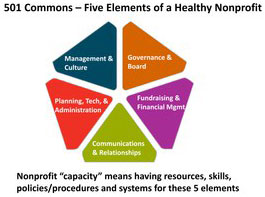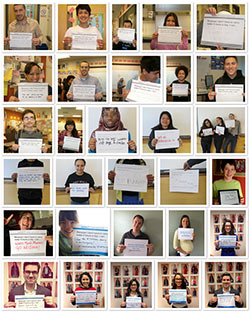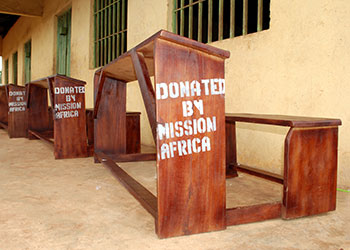Blog
Posted on March 23, 2015
By Nancy Long, Executive Director of 501 Commons
 More and more voices from within philanthropy are arguing that funders need to stop directing the specific uses of their funds and provide general operating grants. Despite studies that show this to be the most effective type of funding, the percentage of general operating grants has been stagnant for the last 10 years.
More and more voices from within philanthropy are arguing that funders need to stop directing the specific uses of their funds and provide general operating grants. Despite studies that show this to be the most effective type of funding, the percentage of general operating grants has been stagnant for the last 10 years.
The narrow channels for money into our sector cause nonprofits to be underfunding administrative and fundraising staff and infrastructure (finance and HR systems, technology, databases, etc.).
General operating grants allow organizations to build organizational capacity and program effectiveness by improving administrative processes that are essential to program success. Nowhere is the capacity conundrum clearer than with evaluation. Funders increasingly expect organizations to have complex data analysis and impact metrics to demonstrate their effectiveness. However, they are often unwilling to provide funding for the administrative staff, evaluation consultants, databases, and infographics needed for robust reporting.
Continue Reading
Posted on March 17, 2015
By Jen Norling, Director of Development and Communications for GlobalWA member Water1st

Share you picture (or video) and earn $1 for Water1st!
For 1 billion people around the world, clean water is anything but easily available. Millions of women and children spend up to 5 hours a day collecting and carrying dirty water for their families. This leaves them no time for school or other work. And very often, the water makes them sick.
What does having clean water in your home allow you to do? Go to school? Spend time with your family? Play a sport? Work at a job you love?
Because I don’t carry water every day, I can __________________.
Tell us, and tell your friends.
All you have to do is:
1. Print this form and write in your answer.
2. Take a photo (or video) of yourself with your message.
3. Share it online:
For each post/submission we receive (by midnight March 22), a generous donor will donate $1 to Water1st.
We’ll post it on our site and enter you in our contest. The person with the most shares and retweets wins a Water1st T-shirt.
Remember, each post earns $1 for Water1st — starting now!
(Deadline: midnight, March 22)
Posted on March 10, 2015
By Tracey Phetsada, Mission Africa
 Fundraising can be a difficult task for any charitable organization, especially for the smaller ones with very limited resources. Friends Nelson Khov and Fareez Ismail understood this limitation when they created getKoupons, a consumer savings website with the sole purpose of giving back to charitable organizations. getKoupons offers an innovative method that makes charitable giving easy, and at no additional cost to donors. With over 300 partner retail stores on getKoupons.com, shoppers can find discounts, deals, coupons and promo codes for their favorite products or stores.
Fundraising can be a difficult task for any charitable organization, especially for the smaller ones with very limited resources. Friends Nelson Khov and Fareez Ismail understood this limitation when they created getKoupons, a consumer savings website with the sole purpose of giving back to charitable organizations. getKoupons offers an innovative method that makes charitable giving easy, and at no additional cost to donors. With over 300 partner retail stores on getKoupons.com, shoppers can find discounts, deals, coupons and promo codes for their favorite products or stores.
Whenever consumers begin shopping from getKoupons.com and purchase from a partner store, getKoupons receives a small referral fee from the stores. In turn, getKoupons donates 100% of its profits to charity. Throughout this month, they will donate 100% of profits to Global Washington member Mission Africa to help fund education, health care services and economic empowerment programs to assist underprivileged children and families in remote villages of Africa.
Founded ten years ago by husband and wife George-Ikoro and Ndudi Chuku, Mission Africa has now expanded its services to nine African countries including Nigeria, Tanzania, Togo, Ghana, Sierra Leone, Kenya, Gambia, Rwanda and Uganda. In 2014, Mission Africa helped 50 Nigerian students stay in school, providing all of their needs through the Mission Africa scholarship program. They provided free medical services to over 350 people, and gave free eye glasses through their medical outreach event in Amaokwe Item, Abia State, Nigeria. Mission Africa also acquired 25 plots of land in Obosima village, Imo State, Nigeria for their proposed Mission Africa health clinic.
 More and more voices from within philanthropy are arguing that funders need to stop directing the specific uses of their funds and provide general operating grants. Despite studies that show this to be the most effective type of funding, the percentage of general operating grants has been stagnant for the last 10 years.
More and more voices from within philanthropy are arguing that funders need to stop directing the specific uses of their funds and provide general operating grants. Despite studies that show this to be the most effective type of funding, the percentage of general operating grants has been stagnant for the last 10 years.
 Fundraising can be a difficult task for any charitable organization, especially for the smaller ones with very limited resources. Friends Nelson Khov and Fareez Ismail understood this limitation when they created getKoupons, a consumer savings website with the sole purpose of giving back to charitable organizations. getKoupons offers an innovative method that makes charitable giving easy, and at no additional cost to donors. With over 300 partner retail stores on getKoupons.com, shoppers can find discounts, deals, coupons and promo codes for their favorite products or stores.
Fundraising can be a difficult task for any charitable organization, especially for the smaller ones with very limited resources. Friends Nelson Khov and Fareez Ismail understood this limitation when they created getKoupons, a consumer savings website with the sole purpose of giving back to charitable organizations. getKoupons offers an innovative method that makes charitable giving easy, and at no additional cost to donors. With over 300 partner retail stores on getKoupons.com, shoppers can find discounts, deals, coupons and promo codes for their favorite products or stores.